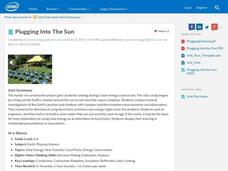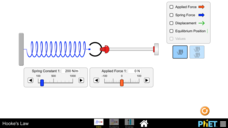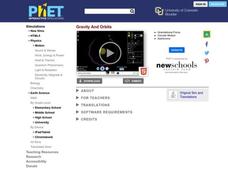Columbus City Schools
Cell-abrate!
Lights, camera, action! With the cell at center stage, guide your seventh grade biologists through the tiny drama that plays out within every living thing. Then, enjoy the show as they portray the organelles they've studied—a performance...
Space Awareness
The Intertropical Convergence Zone
Young scientists know it is hotter along the equator, but why is it also rainier? Through the process of completing two experiments and a worksheet, scholars discover the answer is the intertropical convergence zone. First, they...
Cornell University
Fibers, Dyes, and the Environment
Nanofibers can be made through electrospinning or force spinning in order to reduce the negative impact on the environment. Pupils study the role of fibers and dye on the environment through a series of five hands-on activities. Then,...
Science Matters
Solar Energy
The solar energy industry in the United States added more jobs in 2015 than the oil and gas extraction and pipeline industries combined. With the field growing so rapidly, it's essential to understand what solar energy is and how it...
Science Matters
Thermal Energy Flow in Materials
The sun sends the earth 35,000 times the amount of energy required by all of us on the entire planet, every day. The fourth lesson in the 10-part series looks at how light energy from the sun transfers into thermal energy. Scholars build...
Science Matters
Forms of Energy
The amount of energy Americans use doubles every 20 years. The first lesson in a 10-part series teaches scholars about different forms of energy. They rotate through five stations with hands-on activities or experiments at each in order...
Science Matters
Volcano Models
More than 80 percent of the earth's surface originated from volcanoes. The 16th lesson in a 20-part series introduces the shape and development of volcanoes. It begins with a demonstration using a balloon and flour to illustrate the...
Intel
Plugging into the Sun
What's cooking? A sizzling STEM unit challenges scholars to build a solar cooker that can successfully cook an egg. The unit opens with a study of Earth's rotation, the sun's energy, and shadows. Pupils use a compass and thermometer to...
Intel
Insects: The Good, The Bad, The Ugly
What would the world be like with no insects? Ponder this question using a research-based STEM unit that encourages scholars to investigate insects from both a beneficial and hazardous perspective. They learn about insect behaviors,...
PHET
Projectile Motion
Have you ever wanted to shoot someone out of a canon? This simulation gives you that chance! In addition to a human, you can shoot a car, a piano, a cannon ball, and many other items. Scholars set the angle, initial speed, mass, air...
PHET
Ohm's Law
Why did Mr. Ohm marry Mrs. Ohm? He couldn't resistor. An electrifying simulation allows scholars to control both voltage and resistance in order to see the current change. The formula is displayed and as you increase one variable, it...
PHET
My Solar System
Orbit diagrams appear to be a work of mathematical art. The simulation helps scholars build their own systems of planets, stars, moons, etc., to observe their orbits. By altering their positions, velocities, and masses, a variety of...
PHET
Hooke's Law
Everything from pens to cars use springs — some are just on a larger scale! An interactive simulation encourages pupils to stretch and compress springs while observing the changes to force, displacement, and potential energy. Then they...
Science Matters
Earthquake Waves: Wave Notes
A multi-part lesson opens with a review of p waves and s waves. Then scholars use a simple s wave simulator to view the way the wave travels. Next, pupils use cups and various fluids to simulate p waves moving through different...
PHET
Masses and Springs
Have you ever stretched out a Slinkie so much it wouldn't go back to its original shape? Slinkies, like all springs, follow Hooke's Law. A simulation uses springs and masses to demonstrate kinetic, potential, and thermal energy. It...
PHET
Gravity And Orbits
Have you ever wanted to turn off gravity? This simulation allows learners to do just that in addition to altering other variables. Scholars can move the sun, Earth, moon, and space station to see how distance affects gravitational pull....
PHET
Forces and Motion: Basics
How is tug of war related to pushing a refrigerator? Here's a simulation connects these two activities with Newton's First Law of Motion. Four different simulations allow scholars to explore net force with tug of war, motion with pushing...
PHET
Fluid Pressure and Flow
This simulation begins with an exploration of water pressure and atmospheric pressure. In the flow portion, scholars reshape a pipe and see fluid dynamics at work. The water tower portion encourages pupils to determine how water...
PHET
Energy Skate Park: Basics
Keep calm and half pipe. An exciting simulation teaches pupils about energy transfer from potential to kinetic and thermal as a skater moves through a half pipe or other track. After a brief introduction, scholars can build their own...
PHET
Energy Skate Park
Apply the concepts of conservation of energy to a skater to introduce a fun way the concepts apply to real life. Scholars build tracks, ramps, and jumps then analyze the various types of energy and friction. For an added challenge,...
PHET
Forces and Motion
The average American will move 12 times, which results in a lot of moving furniture! Class members consider the forces required to move objects with a creative simulation that opens with the forces required to push a filing cabinet....
PHET
Faraday's Electromagnetic Lab
"But still try, for who knows what is possible." - Michael Faraday. Faraday's advice features in a simulation that permits pupils to play with a bar magnet in order to make a light bulb glow connecting electromagnetic induction to...
PHET
Energy Forms and Changes
Is the ice cooling down the water or is the water melting the ice? Here is a simulation that explores thermal energy transfer with iron, brick, and water. It demonstrates the flow of energy and what happens when each material is either...
National Park Service
Nutcracker Fantasy
The Clark's nutcracker bird hides seeds in 25,000 different sites every year to save for winter. Lesson demonstrates how difficult it would be to find these seeds months later when they need them for food. In the first of five lesson,...

























